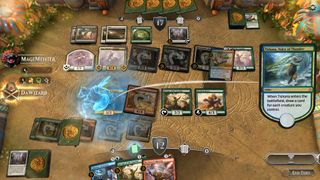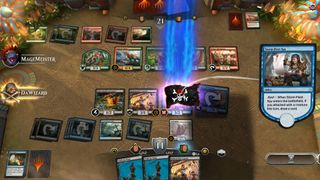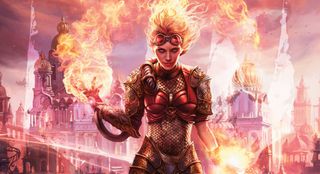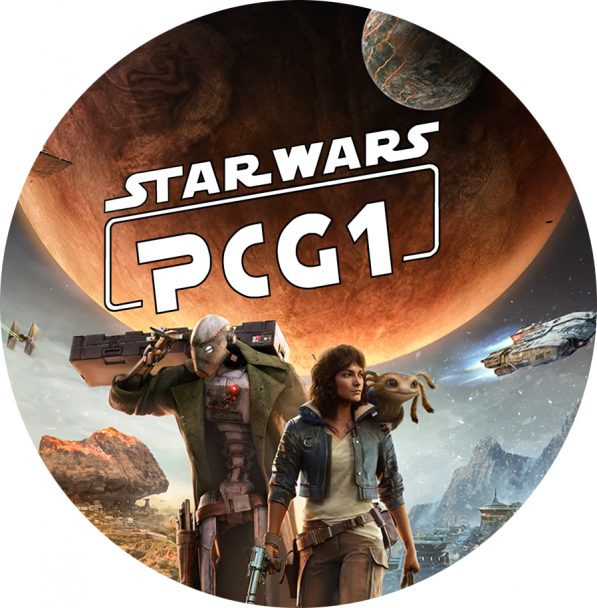Magic: The Gathering Arena is something I’ve wanted for a long time. As a guy who primarily plays Hearthstone and grew up on the more plebeian CCGs like Pokémon TCG and Yu-Gi-Oh!, the chance to jump into Wizards’ decades-old game with minimal investment and a tutorial system was the perfect opportunity to learn about the game that started it all. For the most part, M:TG Arena has provided just that.
The introductory training system taught me the essentials of the game in a way that wasn’t too difficult to grasp, and the cards provided in the beginner sets have enough variety that I was able to get a feel for how different archetypes and mechanics function in the context of the larger metagame.
Then I started playing against other people.

I was prepared to encounter a bunch of powerful cards I hadn’t seen yet, but queuing into constructed mode was like playing a completely different game—all of a sudden I was seeing keywords, card types, and mechanics that weren’t introduced anywhere in the tutorial. The back-and-forth flow of turn sequencing made it difficult to know when it was my turn. Powerful cards like Sagas and Planeswalkers absolutely destroyed me, and even after reading the card text, I struggled to understand how these cards worked or what they were doing to me.
Only by watching some online tutorials and asking MTG-playing friends did I start to grasp what exactly was going on with these mechanics, but for the most part, playing Arena outside of the tutorial environment felt like jumping straight into the deep end without a life vest, which, judging by the efforts the devs have taken to build a robust tutorial, is a pretty jarring transition. The problem expanded when I tried to build my own decks, something the game’s draft modes specifically rely on.
Still, it seems at least a little unfair to judge a card game that’s matured over decades purely on the basis of its new player experience. On one hand, the quality of the onboarding content will definitely determine whether Arena can snag a wider audience, but on the other hand, millions of veteran players don’t need to be eased into the experience whatsoever.
There’s no fighting the fact that Magic isn’t built to be played in a digital environment.
I wasn’t totally lost. Using the game’s prebuilt “Forest’s Might” and “Dragon’s Fire” decks (Dinosaurs and Dragons, respectively), I learned a bit about how the different card colors work while encountering the many ways Magic offers you to win games. By playing more aggressively, I’ve even managed to steal a couple wins off players with much better cards than I’ve got.
Goreclaw, Terror of Qal Sisma has been a fairly nice addition to my green deck that buffs my other creatures and boosts my aggressive capabilities, while Chandra, Torch of Defiance is a powerful Planeswalker card with multiple uses that seems like a pretty solid addition to my red deck. I’m having fun with discovering what cards do and how they work, even if I’m not exactly using them optimally.
Drawing even
Interface and gameplay-wise, Arena feels about par for the course in comparison to its contemporaries. It doesn’t have the smooth sheen or uncanny tactility of Hearthstone, but with tight animations and crisp, cohesive art design, it stands toe-to-toe with games like Gwent and The Elder Scrolls: Legends. Cards feel good to play, and animations never get in the way of the game’s flow.
Still, Magic’s long legacy as a tabletop game means that it’s necessarily had to make some compromises and weird choices, even for players who aren’t beginners like me.
“The biggest concern I have from a digital standpoint is the game’s inability to grasp every aspect of Magic with the same ease as paper,” says Bradford “BradfordLee” Grant, a Magic pro and streamer who’s been playing since the game’s Homelands expansion in 1995. “You may end up finishing a game confused why you lost or confused why you won, which isn’t really a great player experience.”

Brad’s got a list of quibbles like these, and most of them pertain to areas of the game where the jump from physical to digital card game isn’t quite as seamless as it should be. For one, the game’s “Auto-Tap” system, which attempts to guess which land resources you’re trying to use when playing a card, often fails to guess which lands you’d prefer to use when playing a specific card. Also annoying to Brad is the unclear interface that doesn’t adequately depict the sequence of a turn for new players, the clunky sideboarding system that can derail BO3 series, and a collection scheme that makes excess card copies feel completely worthless.
Between the developer’s State of the Beta posts and monthly developer announcement videos, a few of the issues mentioned here are already in the process of being addressed. Auto-Tapping, for one, is said to be undergoing “continuing evolution,” while the gameplay system itself is being constantly revamped to keep things moving at a “comfortable pace.”

But there’s no fighting the fact that Magic isn’t built to be played in a digital environment the way games like Hearthstone, Gwent, and TES:L are. When you play Magic: The Gathering Arena, then, it’s important to know what you’re not getting, at least for now. You’re not getting a casual environment like the old digital Magic releases where you can learn about deck construction against puzzle-like AI opponents. You’re not getting a beginner-friendly experience that slowly eases you into how all the game’s intricacies work. And you’re sure as hell not getting a game where you can copy a netdeck and win your matchups straight away.
What you are getting, though, might be compelling enough to capture a wide audience of card game fans who are looking for a more complex, competitive alternative to many of the other digital card games on the market. And, if you’re already a Magic player, you’re getting a new place where you can easily hone your most important skills in a convenient, modern setting that will evolve in lockstep with the physical game. which you can then take back with you into a physical format that still reigns supreme.

